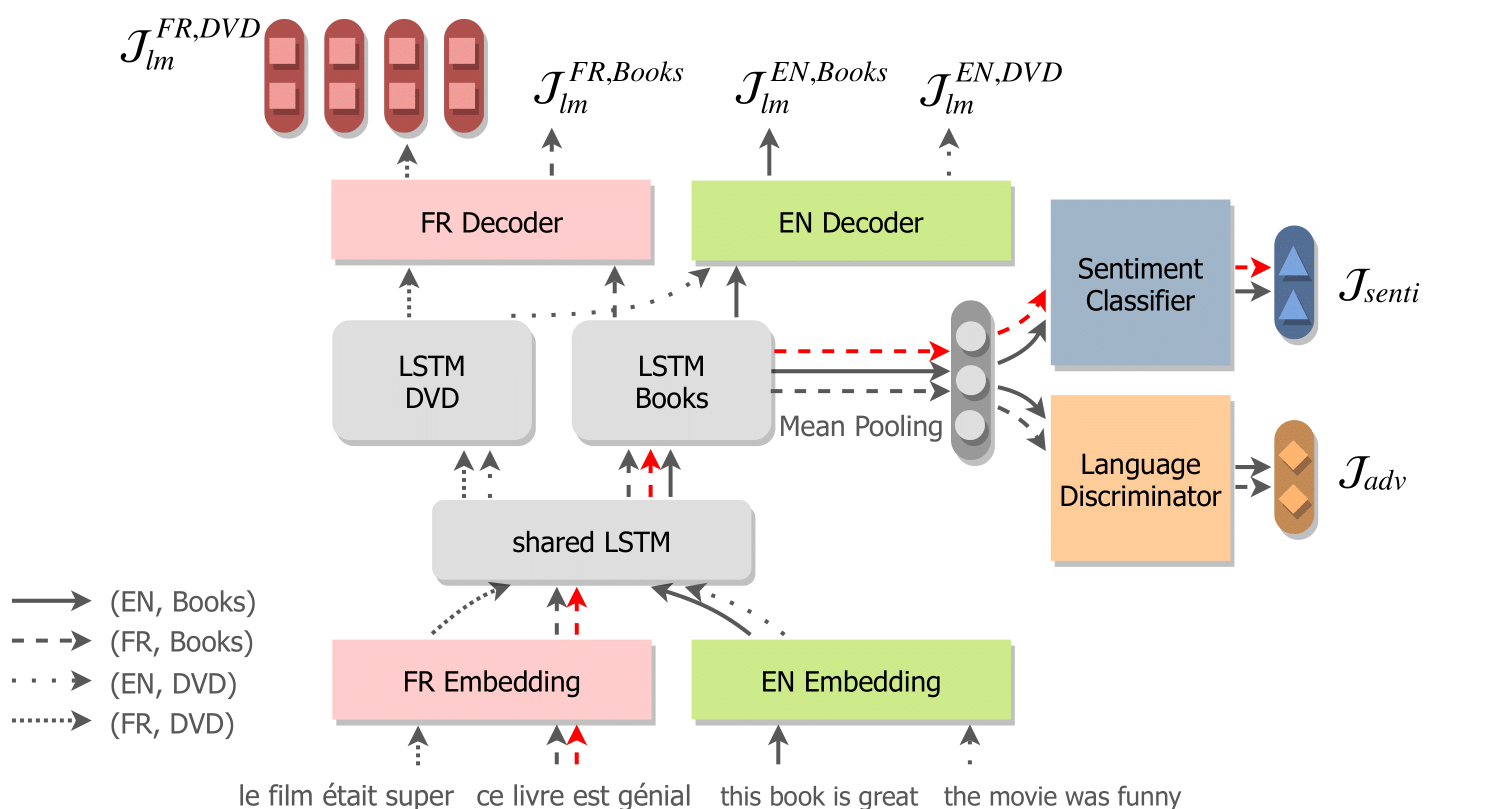UXSenti: Unsupervised Cross-lingual Sentiment Analysis
This repository contains the source code for the CoNLL2019 paper Towards a Unified End-to-End Approach for Fully Unsupervised Cross-Lingual Sentiment Analysis. We present models that perform cross-lingual sentiment analysis (CLSA) in a fully unsupervised setting, without target language annotation or cross-lingual supervision. These models rely on language modeling to transfer the sentiment resources from the source language to the target language. We address two different CLSA settings:
-
Cross-lingual in-domain (e.g. English book reviews for training and Japanese book review for testing)
-
Cross-lingual cross-domain (e.g. English book reviews for training and Japanese music reviews for testing)
Supported languages: English (en) / French (fr) / German (de) / Japanese (ja)
Supported domains: books / dvd / music
Citation
@inproceedings{feng-wan-2019-towards,
title = "Towards a Unified End-to-End Approach for Fully Unsupervised Cross-Lingual Sentiment Analysis",
author = "Feng, Yanlin and
Wan, Xiaojun",
booktitle = "Proceedings of the 23rd Conference on Computational Natural Language Learning (CoNLL)",
month = nov,
year = "2019",
address = "Hong Kong, China",
publisher = "Association for Computational Linguistics",
url = "https://www.aclweb.org/anthology/K19-1097",
}
Dependencies
- Python >= 3.6
- PyTorch 1.1
- NLTK (for English / French / German tokenization)
- Mecab (for Japanese tokenization)
Usage
Download / Preprocess Data
Run the following commands to download the Amazon review dataset:
git clone https://github.com/Evan-Feng/UXSenti.git
cd UXSenti
wget -P data/ http://www.uni-weimar.de/medien/webis/corpora/corpus-webis-cls-10/cls-acl10-unprocessed.tar.gz
tar xvf data/cls-acl10-unprocessed.tar.gz -C data/Then run the following script to preprocess data:
python preprocess.pyThis script will:
- Tokenize the data
- Generate vocabularies for all the languages
- Binarize the training / test data
The resulting file structure will look like:
.
├── README.md
└── data
├── train.pth (binarized training data)
├── test.pth (binarized test data)
├── tokenized
│ ├── en.books.unlabeled (tokenized unlabeled data from the EN-BOOK domain)
│ ├── en.books.train (tokenized training data)
│ ├── en.books.test (tokenized test data)
│ └── ...
└── vocab
├── en.vocab (English vocabulary)
├── fr.vocab (French vocabulary)
├── de.vocab (German vocabulary)
└── ja.vocab (Japanese vocabulary)
Run Cross-lingual In-Domain SA
Run the following command to train a CLIDSA_{full} model:
python cross_lingual_in_domain.py --export export/clid/By default, English is used as the source language and the others are used as target languages (note that using multiple target languages only affects the evaluation). To use a different source language, simple run:
python cross_lingual_in_domain.py --src fr --trg en de ja --export export/clid2/To run the experiment in a different domain:
python cross_lingual_in_domain.py --src fr --trg en de ja --sup_dom music --export export/clid3/To run CLIDSA_{min}:
python cross_lingual_in_domain.py --lang en fr --src en --trg fr --dom books --sup_dom books --export export/clid4/
To run all the CLIDSA experiments (including CLIDSA_{full}, CLIDSA_{min} and MWE):
bash run_clid.shRun Cross-lingual Cross-Domain SA
Run the following command to train a CLCDSA model:
python cross_lingual_cross_domain.py --export export/clcd/By default the transfer direction is from EN-DVD to DE-Books. To specify a different direction:
python cross_lingual_cross_domain.py --src fr-music --trg de-books --export export/clcd2/To run all the CLCDSA experiments (including CLCDSA and MWE):
bash run_clcd.sh